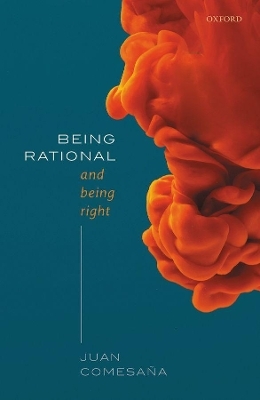
Being Rational and Being Right
Seiten
2020
Oxford University Press (Verlag)
978-0-19-884771-7 (ISBN)
Oxford University Press (Verlag)
978-0-19-884771-7 (ISBN)
Juan Comesaña presents a new framework for understanding the rationality of action and belief, which he calls "Experientalism". Arguing that rational action requires rational belief but tolerates false belief, Comesaña provides a novel account of empirical evidence as consisting of the content of undefeated experiences.
In Being Rational and Being Right, Juan Comesaña argues for a cluster of theses related to the rationality of action and belief. His starting point is that rational action requires rational belief but tolerates false belief. From there, Comesaña provides a novel account of empirical evidence according to which said evidence consists of the content of undefeated experiences. This view, which Comesaña calls "Experientialism," differs from the two main views of empirical evidence on offer nowadays: Factualism, according to which our evidence is what we know, and Psychologism, according to which our experiences themselves are evidence. He reasons that Experientialism fares better than these rival views in explaining different features of rational belief and action. Comesaña embeds this discussion in a Bayesian framework, and discusses in addition the problem of normative requirements, the easy knowledge problem, and how Experientialism compares to Evidentialism, Reliabilism, and Comesaña's own (now superseded) Evidentialist Reliabilism.
In Being Rational and Being Right, Juan Comesaña argues for a cluster of theses related to the rationality of action and belief. His starting point is that rational action requires rational belief but tolerates false belief. From there, Comesaña provides a novel account of empirical evidence according to which said evidence consists of the content of undefeated experiences. This view, which Comesaña calls "Experientialism," differs from the two main views of empirical evidence on offer nowadays: Factualism, according to which our evidence is what we know, and Psychologism, according to which our experiences themselves are evidence. He reasons that Experientialism fares better than these rival views in explaining different features of rational belief and action. Comesaña embeds this discussion in a Bayesian framework, and discusses in addition the problem of normative requirements, the easy knowledge problem, and how Experientialism compares to Evidentialism, Reliabilism, and Comesaña's own (now superseded) Evidentialist Reliabilism.
Juan Comesaña is Professor of Philosophy at the University of Arizona. Prior to this, he obtained his PhD from Brown University and then taught at the University of Wisconsin, Madison for six years. He works mainly in epistemology, though he is also interested in metaphysics and metaethics.
1: Introduction
2: Probability and Decision Theory
3: Objective Bayesianism and Knowledge-First Epistemolog
4: Knowledge-Based Decision Theory
5: Excuses, Would-Be Knowledge, and Rationality-Based Decision Theory
6: Experientialism
7: The Normative Force of Unjustified Beliefs
8: The Problem of Easy Rationality
9: Evidentialism, Reliabilism, Evidentialist Reliabilism?
10: Conclusion
| Erscheinungsdatum | 30.05.2020 |
|---|---|
| Verlagsort | Oxford |
| Sprache | englisch |
| Maße | 159 x 232 mm |
| Gewicht | 496 g |
| Themenwelt | Geisteswissenschaften ► Philosophie ► Erkenntnistheorie / Wissenschaftstheorie |
| Geisteswissenschaften ► Philosophie ► Ethik | |
| Wirtschaft ► Betriebswirtschaft / Management ► Allgemeines / Lexika | |
| ISBN-10 | 0-19-884771-8 / 0198847718 |
| ISBN-13 | 978-0-19-884771-7 / 9780198847717 |
| Zustand | Neuware |
| Informationen gemäß Produktsicherheitsverordnung (GPSR) | |
| Haben Sie eine Frage zum Produkt? |
Mehr entdecken
aus dem Bereich
aus dem Bereich
die Grundlegung der modernen Philosophie
Buch | Softcover (2023)
C.H.Beck (Verlag)
18,00 €
Buch | Softcover (2023)
Reclam, Philipp (Verlag)
7,00 €

![Was heißt Denken?. Vorlesung Wintersemester 1951/52. [Was bedeutet das alles?] - Martin Heidegger](/media/113619842)
